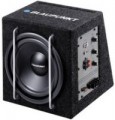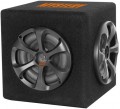Enclosure type
—
Closed box. The simplest type of case: a box closed on all sides with a speaker (speakers) on the front panel. The advantages of such models are high accuracy of sound transmission and low cost, the disadvantages are low sensitivity and somewhat “flat” bass.
—
Phase inverter. A classic phase inverter is a hollow tube connecting the internal volume of the case with the outside world (however, there are other options for such a connection). The length of the phase inverter channel is chosen so that the sound waves of a certain range, passing through it, are inverted in phase relative to the waves from the speaker (hence the name). This improves (in particular, "deepens") the sound of the subwoofer and allows you to achieve good performance with a small cabinet size. On the other hand, the sound stream in the tube creates a certain additional noise.
—
Strip. A design that combines the features of a closed box and a bass-reflex enclosure. One of its parts is made closed, and the second is equipped with a phase inverter tube; between them is a partition, on which the main speaker is located. Unlike previous types, the speaker is entirely inside the case. Strip-line enclosures provide louder sound than boxes or bass reflexes, with sound quality comparable to the latter. The disadvantage is the complexity of the design, as a result — a slightly higher price.
Size
The size (diameter) of the main subwoofer speaker. In all types of subwoofers, this parameter primarily affects the power and depth of sound: the larger the speaker, the louder it is and the deeper the bass it can provide (ceteris paribus). However with an increase in the size and dimensions, they increase accordingly, which determines the installation possibilities. The latter is especially true in Free Air subwoofers (see "Execution"): some cars are initially equipped with "seats" for a certain size, and it is difficult to install models with other dimensions there.
Now on the market there are subwoofers with such popular sizes:
5" (13 cm),
6" (15.25 cm),
6.3" (16 cm),
6.5" (16.5 cm),
6.75" (17 cm),
8" (20 cm ),
8.25"(21cm) , 9" (23cm
), 10" (25cm
),
11" (27cm),
12"(30cm) ,
13" (33cm),
15"(38cm) ,
16 " (40 cm),
18" (46 cm).
Number of woofers
The number of main speakers installed in the subwoofer. Most models are equipped with a single speaker, which is considered sufficient for quite decent bass reproduction.
Models with two speakers sound louder and have better sensitivity, but are complex in design (as a result, more expensive) and more difficult to install, and therefore are relatively rare.
Rated power
The average (root mean square — RMS) power of the input signal, at which the subwoofer is able to work continuously without negative consequences (damage, failure) for at least an hour. The rated power of the subwoofer must be greater than the power of the amplifier connected to it — in order to avoid overloads.
Max. power
The maximum signal power that the subwoofer is able to withstand for a short time (up to several seconds) without any negative consequences. When selecting an amplifier-subwoofer pair, it is recommended to take a subwoofer with a maximum power of at least twice the maximum power of the amplifier. In general, the higher the maximum power, the more resistant the subwoofer is to overloads.
Frequency range
The range of audio frequencies reproduced by the subwoofer. It is believed that the human ear is capable of perceiving a frequency range of the order of 16 – 20,000 Hz, but in this case note that the subwoofer is designed to reproduce the lower frequency band (up to 200 Hz). Accordingly, in the case of the lower limit of the range, everything is simple: “the lower, the better”; the upper one should not be lower than the lower limit of the main car audio — otherwise there will be "gaps" in the frequencies, which will affect the sound quality.
Sensitivity
Sensitivity determines the loudness of the subwoofer when a signal of a certain power is connected to it: with equal signal power and impedance (see below), the subwoofer with the higher sensitivity will sound louder.
Dual voice coil
A dual voice coil is actually two separate voice coils on the same speaker. This allows you to connect two amplifiers to the subwoofer at once, thus providing high sound power.
Impedance
The electrical resistance of a subwoofer when a signal is applied to it. This parameter is important primarily for selecting a subwoofer-amplifier pair: at a lower impedance than that of the amplifier, the subwoofer will distort the sound, at a higher impedance the sound will be too quiet.
For dual voice coil models (see above), the impedance is specified for one of the voice coils.

